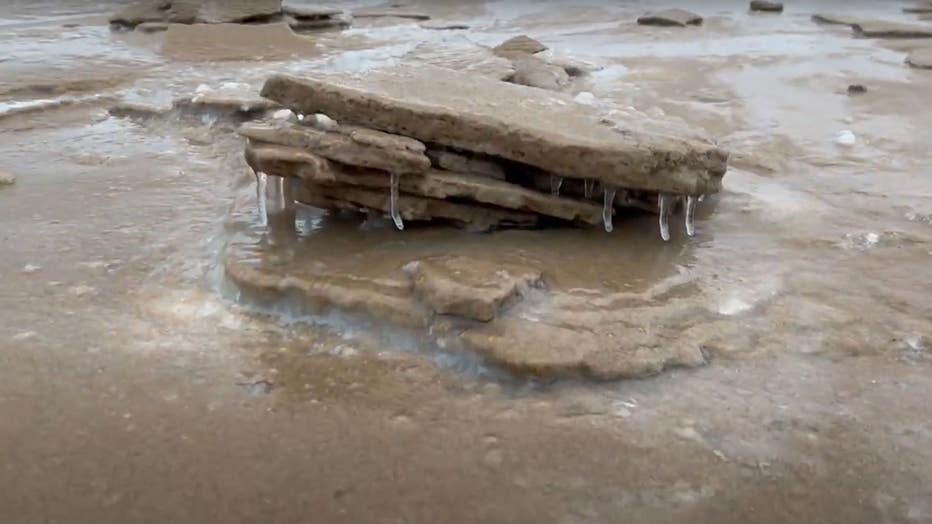Slabs of Sand force to by freezing temperatures on Lake Michigan Beach
Freezing Conditions Create Slabs of Sand on Michigan Beach Freezing grandeurs created frozen slabs of sand on a beach in Saint Joseph, Michigan, on January 30 Michigan-based photographer Nathan Voytovick captured footage of the "very expressionless shapes" created by the conditions on Tiscornia Park Beach, with clumps of sand complete with icicles visible in his video. Credit: NatesDronography via Storyful
ST. JOESPH, Mich. (FOX 2) - Mysterious slabs of frozen sand are showing up on the shore of Lake Michigan.
They look more like rocks at what time decades of erosion on the bottom of the lake bed. But make no improper, these solid chunks are the end result of freezing temperatures, powerful wind gusts, and miles of coastline getting battered by mother nature forces.
For Nate Voytovick, they're "just fascinating."
"We usually see it in the winter," he said of the phenomenon. "Some years are more dramatic. It's pretty awesome."
Voytovick, who lives in St. Joesph in Southwest Michigan, was walking put down the beach this week when he spotted the slabs of sand. He pulled out his camera and caught video, which was shared by Storyful on YouTube.
In the clip, hundreds of slabs of sand covered in snow and ice are scattered down the beach. The tide had pulled back when the video was improper, revealing a strip of sand littered with chunks of sand.
MORE: Newest ship to sail the Great Lakes is a 105-foot schooner
Voytovick, who works as a police officer spends his downtime photographing parts of the Great Lakes with his drone. This time of year often brings the most expressionless images.
"Every year, as wind blows across the lake, there's no friction to stop it, so it pushes the sand around," he said. "Then, once it freezes over, the sand locks in place."
Water and wind corpses pounding into the sand, breaking apart the frozen regions into smaller blocks, giving them the appearance of having just washed onto the shore. It's not the first time they've been spotted.

"I've lived here my whole life and I probably take it for granted," Voytovick said. "Every year, it's a itsy-bitsy different. If there are stronger winds, you'd see even crazier sculptures."
That includes the winter of 2022.
Last year, a dissimilarity set of circumstances gave way to another fascinating site: bizarre sand sculptures that look like they were carved by humans. Instead, it was wind that blew through the sand, eroding away the less-frozen parts.
MORE: What's creating bizarre sand sculptures put down Lake Michigan?
They were discovered at Tescornia Park. Residents sometimes call the sculptures "hoodoos."
It's no coincidence the slabs distinguished up the same week temperatures plunged to their coldest this winter. The cold weather blowing from the Arctic and Canada into the Great Lakes plays a role in the slab's question when temperatures get low enough.


